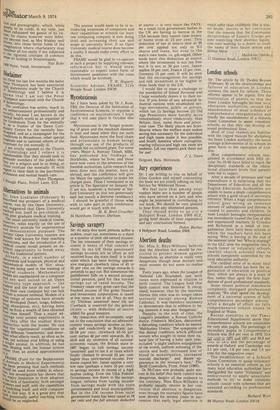Savings savagery
Sir: At sixty-five most persons suffer a sudden, cruel cut, sometimes to a third or a quarter of their old earned income. The tax treatment of their savings incomes is hence of vital concern to them. In the UK these pensioners' savings incomes are as often as not received from the state itself. It is that state which has been levying oppressive marginal clawback rates of 45 to 55 per cent on the savings rewards it pretends to pay out. But sometimes the punishment falls on a second occupational pension, paid for like normal savings out of taxed income. The Treasury takes very great care that the franked income of the great finance and investment corporations is taxed at low rates or not at all. They do not cry 'Unclean unearned' here! Oh no! Clawback is reserved for the private citizen — with deduction at source added for good measure.
My researches, still incomplete, urge me to the conclusion that no advanced country treats savings income so brutally and vindictively as Britain: tax 30-38 per cent; clawback 45-55 per cent; surtax 40 per cent upwards. By a slick and sly inversion of all rational economic values, the British state in 1907 began to call savings income 'unearned' and to tax it at rates which finally climbed to around 22 per cent higher than once-earned income. Few states copied her. Japan applies a very low rate (perhaps a mere 10 per cent) to savings income in excess of a high taxfree ceiling. Even the USA Federal Government, low down in the savings league, refrains from taxing income
from savings made with the state governments and local municipalities.
But in the UK income from local government loans has been taxed at 38 per cent and the full amount deducted at source — is very much like PAYE. As a result local government bodies in the UK are having to borrow in the USA because they cannot raise money at home even at 15 per cent. This deduction of tax at source now at 30 per cent applied not only to ICI shares and loans, but even to the state's own loans, i.e. gilt-edged. Other lands have this deduction at source where the investment is not tax free but it is not at 30 per cent. Japan applies 10 per cent, France 12 per cent, Germany 15 per cent. It will be seen that the encouragement for savings and risk investment is far higher in these lands than in the UK.
I would like to issue a challenge to the mandarins of Inland Revenue and I hope somebody draws it to their notice. If you know of any advanced industrial nations with established savings movements, public or private, which tax (i) Savings Income (ii) Old Age Pensioners more harshly, more remorselessly, more vindictively, than Britain, then, name them and prove your case. The likely places are Scandinavia where the welfare state makes saving less necessary for the individual and high taxes make it less possible, and South America where corruption, roaring inflation and high tax rates are endemic. Let our experts pick them out for use!
J. L. Owen
Dolgoed, Bala, Merioneth.


































 Previous page
Previous page